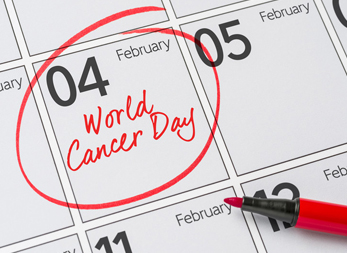 February 4, World Cancer Day is an international observance founded by the Union for International Cancer Control (UICC) to support the goals of the World Cancer Declaration written in 2008. The primary goal of World Cancer Day is to significantly reduce the illness and death caused by cancer by raising awareness and education, and urging governments and individuals across the globe to take action against the disease. Every year, cancer is responsible for 8.2 million deaths worldwide and more than 600,000 deaths in the US. World Cancer Day is the time for individuals, organizations and governments to take up arms against this illness.
February 4, World Cancer Day is an international observance founded by the Union for International Cancer Control (UICC) to support the goals of the World Cancer Declaration written in 2008. The primary goal of World Cancer Day is to significantly reduce the illness and death caused by cancer by raising awareness and education, and urging governments and individuals across the globe to take action against the disease. Every year, cancer is responsible for 8.2 million deaths worldwide and more than 600,000 deaths in the US. World Cancer Day is the time for individuals, organizations and governments to take up arms against this illness.
Cancer is a heterogeneous group of diseases that result from abnormal cell growth. The growth often invades surrounding tissue and spread to other parts of the body. As Cancer Research UK explains, the risk of getting cancer depends on a combination of our genes, our environment, and our lifestyle, a factor over which we have considerable control. If detected early, many cancers can be treated and cured with the help of surgery, radiotherapy or chemotherapy.
A three-year campaign from 2016-2018 with the tagline “We can. I can” is underway to unite the world’s population in the fight against cancer. World Cancer Day is a chance to reflect on what every community and individual can do to support this cause. Across the world, communities will hold walks, seminars, public information campaigns, and other events to raise the profile of cancer in a positive and inspiring way. Such events can educate people on how to fight cancer through screening and early detection and leading a healthy lifestyle, and also urge public officials to make cancer issues a priority.
As an individual, you can:
- Make healthy lifestyle choices that include avoiding tobacco, smoking, limiting alcohol intake, doing routine physical activity and eating a healthy diet.
- Be aware about the signs and symptoms of cancer and early detection guidelines, as finding the illness early makes it easier to treat.
- Support cancer patients or survivors physically and emotionally, even after the treatment ends.
- After cancer treatment, return to work if possible. This helps to restore normality, routine, stability, social contact, and income.
As a community, we can:
- Urge governments to commit adequate resources to reduce cancer deaths and provide a better quality of life for patients and survivors.
- Educate people about the link between lifestyle behaviors and cancer risks.
- Encourage schools and workplaces to adopt practices that promote a safe environment and healthy habits
- Eliminate myths that discriminate against people with cancer
- Make a case for investing in cancer control and improve access to affordable cancer healthcare for all.
Experts say that more than 4 in 10 cases of cancer could be prevented by lifestyles changes such as not smoking, maintaining a healthy body weight, eating a healthy, balanced diet, reducing alcohol intake, staying safe when out in the sun, keeping active, doing what’s possible to avoid HPV, hepatitis, and other infections, and reducing cancer risks in the workplace.
Take a pledge today to join the fight against cancer.